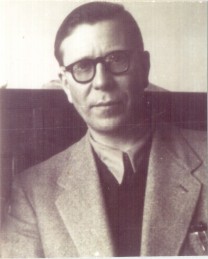Günter Wagner was born in Berlin in 1908, where he spent his childhood and youth. After finishing school in 1926 he took up his studies of Anthropology. After brief periods at the universities in Freiburg and Hamburg, Wagner moved to New York. There he attended lectures by Franz Boas at the Columbia University.
In 1929 Wagner conducted his first field work, namely among the Yuchi people in North America. During this research he collected the ethnographic data used for his Ph D thesis on the Peyote cult. Wagner subsequently graduated at the University of Hamburg in 1932.
During the following years Wagner lectured at several universities in the US, e.g., in Berkeley and Chicago. Moreover, he did further field researches, this time among the Comanche. In 1933 Wagner received a scholarship of the Rockefeller foundation and took up his research work in Kenya on behalf of the newly founded International African Institute located in London. Until 1939 Wagner did several long term researches, e.g., among the Luhya people.
After his return to Germany, Wagner completed his habilitation thesis in 1940. He subsequently took up a position at the Eberhards-Karl University in Tübingen. Moreover, Wagner worked for the Third Reich Ministry of Public Enlightenment and Propaganda. He participated in World War II.
At the end of World War II Wagner was dismissed from his position at the university in Tübingen. During the following years he mainly did translational work. In 1950 Wagner became Assistant Government Ethnologist at the Department of Native Affairs in Southwest-Africa (now: Namibia). There he conducted field work among the Herero people.
Günter Wagner died of pneumonia in 1952.
(Text written by Vincenz Kokot in July 2012, based on Wikipedia and an obituary by Baumann, Hermann, 1953, ZfE; photo shows Günter Wagner in Pretoria (1950), by courtesy of Wagners daughter, Gaby von Pape, via Udo Mischek)
Short Portrait: Günter Wagner

Günter Wagner
 further information
further information

